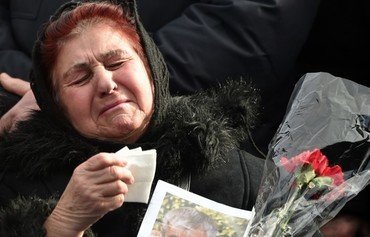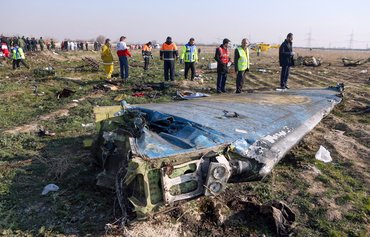After having initially dragged its feet on sending abroad the black boxes of a Ukrainian plane its forces mistakenly shot down in January, Iran is now saying that the coronavirus (COVID-19) pandemic is further delaying those plans.
Iran has admitted that the two black boxes were damaged and that it lacked the technical ability to extract data from them, but for two months after the tragedy it waffled about what to do with them.
Countries whose citizens died in the disaster -- which included mostly Iranians but also Afghans, Britons, Canadians, Swedes and Ukrainians -- had criticised Iran's refusal to hand the plane's black boxes to Ukraine or one of the few countries capable of recovering and analysing the data they contain.
Still, on Monday (June 15th), Iranian government spokesman Ali Rabiei said that "from the first days of this painful incident, we announced our readiness to co-operate in investigating the black boxes of the Ukrainian plane".
"If it is possible to read them in Ukraine... this will be done in Ukraine. Otherwise, the black boxes will be read in France," he said.
But he said the process had been slowed by the coronavirus pandemic, which has seen most international flights cancelled.
"The interruption of international flights linked to the coronavirus epidemic caused an involuntary delay," said Rabiei.
"We will resume this process (of sending the black boxes) with the gradual resumption of international flights and the clarification of the results of the negotiations" between Iran and others involved in the process.
Words not enough
Flight 752, a Ukraine International Airlines jetliner, was struck by two missiles and crashed shortly after taking off from the Tehran airport on January 8th.
The Islamic republic admitted days later that its forces accidentally shot down the Kiev-bound jetliner, killing all 176 people on board.
Tehran's air defences had been on high alert at the time in case the US retaliated against Iranian strikes hours earlier on American troops stationed in Iraq.
Those strikes were carried out in response to the killing of top Iranian general Qassem Soleimani in a US drone strike near Baghdad airport.
The black boxes are expected to contain information about the last moments before the aircraft was struck and crashed.
Canada has demanded for months that Iran, which does not have the technical means to decode the black boxes, send the items abroad so that their content can be analysed.
Canada said two months ago that it and other countries asked Tehran to delay downloading data on the black boxes, because of the coronavirus travel restrictions.
After Tehran said in March it was ready to transfer the black boxes to France or Ukraine, Canadian Foreign Minister Francois-Philippe Champagne guardedly welcomed a "step in the right direction".
But he noted that he would judge Iranian authorities on "their actions and not just their words".
Iran says its novel coronavirus outbreak has killed 8,950 people and infected nearly 190,000 since reporting its first cases in February.

![Relatives of the 11 Ukrainians who died in a plane mistakenly shot down by Iran in January, react during a ceremony unveiling a memorial stone at the site of the future monument at the Boryspil International airport outside Kiev on February 17th. [Sergei Supinsky/AFP]](/cnmi_am/images/2020/06/16/24584-Ukraine-Kiev-airport-600_384.jpg)






